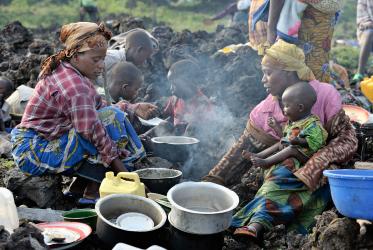Displaying 181 - 200 of 222
06 May 2016
Faith at AIDS 2016: WCC preparing for faith in action
10 March 2016
WCC convenes strategic meeting on sustainable development goals
11 February 2016
Tveit on the “Ten Commandments” of food
26 January 2016
WCC/UN conference calls for coordinated action on refugee crisis
20 January 2016
New video presents Ecumenical Advocacy Alliance’s call to action
13 January 2016
Consultation considers right to food in context of climate change
15 December 2015
Action Alert: AIDS 2016 - Applications open for interfaith chaplains
11 December 2015
COP21: how climate change affects access to our daily bread
09 December 2015
No place for hunger in a world of abundance
02 October 2015














